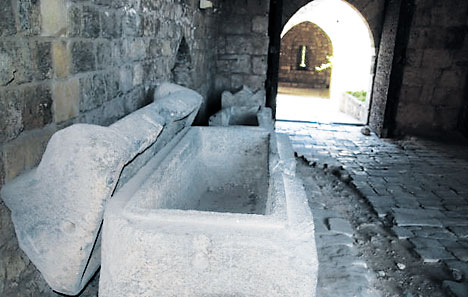The Bones of Elisha
or What’s the Problem with Matthew 27:51-53?
Then, behold,
(Day 1 – Imperative / Light)
…..the veil of the temple
…..was torn in two
…..from top to bottom;
…..(Day 2 – Delegation / Waters)
……….and the Land quaked,
……….and the rocks were split,
……….(Day 3 – Law-Promise given)
……………and the graves were opened;
……………(Day 4 – Law-Promise opened)
……….and many bodies of the saints
……….who had fallen asleep were raised;
……….(Day 5 – Swarms / Witnesses)
…..and coming out of the graves
…..after His resurrection,
…..(Day 6 – Mediators)
they went into the holy city and appeared to many.
(Day 7 – Bridal Entry)
I’ve just read a few blog posts and comments concerning this text, and although it seems to us moderns to be
a) off-the-cuff,
b) strange, and to some academics
c), utterly incredible,
this is because the academics I was reading
a) are unfamiliar with literary structure and typology,
b) imagine a some discontinuity between the strange Old Testament prophets and Jesus, and
c) won’t believe the bizarre bits of the Bible unless they find them
i) corroborated elsewhere in the Bible,
ii) corroborated in Josephus, etc., or
iii) can discredit them by classifying them as a genre (such as apocalyptic, which is not a biblical genre) that renders them non-historical and thus non-embarrassing.
This
is
disgusting.
I’m not sure what the problem is with this event. Resurrection is always corporate, always plural. [1] Christ, the first “grain of wheat,” handed the baton on to His disciples and they did the same — as grains of Pentecostal wheat. The Garden “died” for the Land and the Land “died” for the World.
Their deaths resulted in what Revelation calls the “first” resurrection — all the Old Covenant saints entering into their rest, seated on thrones and judging (taking vengeance) on the leaders of Israel. That’s what Revelation’s about.
So the stuff that happens at the crucifixion and resurrection of Christ-as-Israel was a microcosm of the events that would happen to Israel herself over the following generation — “this generation.”
Judas was expelled, so Judah was expelled. The rocks were split and the veil was torn, so the Land was divided by the Gospel and the Temple was destroyed. And the small-scale resurrection in Matthew 27 prefigured the ascension of the “saints under the altar,” who had to wait until the final legal (i.e. “two”) witnesses testified against the Herodian Sodom/Egypt/Jericho/Babylon.
What do the preceding verses say? Which prophet prefigured the Ascension? [2] Which prophet prefigured the Resurrection? Jesus’ murderers, though they misheard Him, and though they themselves were “whited tombs,” knew the Scriptures.
The rest said, (Initiation)
…..“Let Him alone; (Delegation)
……….let us see if Elijah (Ascension)
………..will come to save Him.” (Offering)
……………And Jesus (Purification)
……….cried out again (Deut. Transformation)
…..with a loud voice, (Vindication / Oath)
and yielded up His spirit. (Ingathering)
(Matthew 27:49-50)
Then Elisha died, (De-Creation / Sabbath)
…..and they buried him. (Prostration / Passover)
……….And the [raiding] bands
……….from Moab invaded the land
……….in the spring of the year. (Firstfruits)
……………So it was, as they were burying a man,
……………that suddenly they spied a band [of raiders;]
……………(Testing – Pentecost)
……….and they put the man in the tomb of Elisha;
……….(Trumpets / Prophets)
…..and when the man was let down
…..and touched the bones of Elisha, (Atonement / Coverings)
he revived and stood on his feet. (Tabernacles / Succession)
(2 Kings 13:20-21)
____________________________________
[1] See Greater Eve.
[2] See The Lost Ark.



























December 23rd, 2011 at 10:55 pm
I knew there was something wrong with this! Lost the plot along the way. Apologies, very tired. All fixed now.
December 25th, 2011 at 3:18 pm
not sure why you would say that apocalyptic is not a biblical genre
December 28th, 2011 at 8:29 am
Hi Mark
I am prone to overstatement (I am a designer) but I reckon the idea of biblical genres gets used to mask a lot of evangelical unbelief. Classing a Bible passage as a particular genre is for many a way of subtly putting the Bible under our control, of using a literary classification to exalt human authority over an inspired text. I’ve read how the Revelation supposedly draws upon second Temple Jewish literature (when it really doesn’t). The Bible isn’t man’s thoughts about God, it is actually a revelation. So although we can see a difference between Daniel/Revelation and the gospels, all the Scriptures are far more intertwined than these compromised commentators would have us believe. They need to learn the very consistent symbol language as it develops between Genesis and Revelation, and God’s use of architectural and creational types. When Revelation gets called “apocalyptic” its mostly by scholars who have little idea what the book is about, and interpret it as idealogy, rather than the final warning in a Covenant lawsuit.
Happy to discuss further.